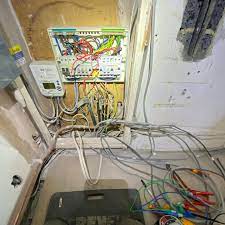Domestic electrical installations are an integral part of our everyday lives, powering our homes and providing the energy needed for various appliances. While electricity has undoubtedly improved our quality of life, it also poses significant risks if not installed and maintained correctly. In this blog post, we will explore some essential tips to ensure safe domestic electrical installation.
1. Hire a Qualified Electrician
When it comes to electrical installations, it’s crucial to hire a qualified and licensed electrician. Experienced professionals understand the complexities of electrical systems, ensuring that installations meet safety standards and local regulations. Attempting DIY electrical work without proper knowledge can lead to accidents, fires, and even fatalities.
2. Plan Your Electrical Layout
Before any installation work begins, plan your electrical layout carefully. Determine the placement of outlets, switches, and appliances. Consider future needs and ensure the wiring can support additional loads. A well-thought-out plan minimizes the chances of overloading circuits and enhances the functionality of your home.
3. Choose Quality Materials
Invest in high-quality electrical components, such as wires, switches, outlets, and circuit breakers. Quality materials are designed to withstand wear and tear, reducing the risk of electrical faults. Always opt for products that meet safety standards and carry certification marks from relevant authorities.
4. Install Ground Fault Circuit Interrupters (GFCIs)
GFCIs are essential safety devices that protect against electric shock and electrical fires. Install GFCIs in areas where water and electricity may come into contact, such as kitchens, bathrooms, and outdoor outlets. These devices quickly shut off power when they detect a ground fault, preventing dangerous situations.
5. Adequate Wiring and Circuit Breakers
Ensure that your home’s wiring and circuit breakers are appropriately sized for the electrical load. Overloaded circuits can lead to overheating and pose a fire hazard. If you plan to install new appliances or devices, consult with an electrician to assess whether your existing wiring and circuit breakers can handle the additional load.
6. Regular Inspections and Maintenance
Regular inspections are crucial to maintaining a safe electrical system in your home. Schedule periodic checks with a qualified electrician to identify any issues promptly. Signs of wear, exposed wires, or flickering lights should be addressed immediately to prevent potential problems.
7. Practice Electrical Safety
Educate your family members about electrical safety practices. Avoid overloading outlets, unplug appliances when not in use, and keep flammable materials away from electrical devices. Teach children about the dangers of electricity and the importance of not playing with outlets or switches.
